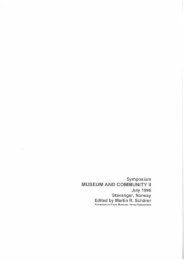Key Concepts of Museology - ICOM
Key Concepts of Museology - ICOM
Key Concepts of Museology - ICOM
You also want an ePaper? Increase the reach of your titles
YUMPU automatically turns print PDFs into web optimized ePapers that Google loves.
MANAGEMENT<br />
n. – Equivalent French: gestion; Spanish: gestión;<br />
German: Verwaltung, Administration; Italian:<br />
gestione; Portuguese: gestāo.<br />
Museum management is defi ned<br />
today as the action <strong>of</strong> ensuring the<br />
running <strong>of</strong> the museum’s administrative<br />
business and, more generally,<br />
all the activities which are<br />
not directly attached to the specifi c<br />
fi elds <strong>of</strong> museum work (preservation,<br />
research and communication). In this<br />
regard, museum management essentially<br />
encompasses tasks relating to<br />
fi nancial (accounting, management<br />
control, fi nances) and legal responsibilities,<br />
to security and upkeep, to<br />
staff management and to marketing<br />
as well as to strategic procedures<br />
and the general planning <strong>of</strong> museum<br />
activities. The term management is<br />
<strong>of</strong> Anglo-Saxon origin (although<br />
the Anglo-Saxon term comes from<br />
the French manège and ménage),<br />
and is currently used in French with<br />
the same meaning. The guidelines<br />
or ‘style’ <strong>of</strong> management illustrate<br />
a certain concept <strong>of</strong> museums – in<br />
particular its relationship to public<br />
service.<br />
Traditionally the term administration<br />
(from the Latin administratio,<br />
M<br />
service, aid, handling) was used to<br />
defi ne this type <strong>of</strong> museum activity,<br />
but also, more generally, all the activities<br />
necessary to make a museum<br />
function. The treatise <strong>of</strong> museology<br />
by George Brown Goode, Museum<br />
Administration (1896), examines the<br />
aspects connected with the study <strong>of</strong><br />
the display <strong>of</strong> collections and the daily<br />
management, while also addressing<br />
the overall vision <strong>of</strong> the museum and<br />
its integration into society. Rightfully<br />
derived from the civil service rationale,<br />
the act <strong>of</strong> administering means,<br />
whether referring to a public or a private<br />
service, ensuring that it operates<br />
properly while taking responsibility<br />
for initiating and running all its activities.<br />
The notion <strong>of</strong> (public) service,<br />
or even, with its religious undertones,<br />
that <strong>of</strong> vocation, is closely related to<br />
administration.<br />
We are aware <strong>of</strong> the bureaucratic<br />
connotation <strong>of</strong> the term ‘administration’<br />
since it is used in connection<br />
with the (dys)function <strong>of</strong> public<br />
authorities. So it is not surprising that<br />
the general evolution <strong>of</strong> economic<br />
theory in the last quarter <strong>of</strong> a century,<br />
favouring the market economy, has<br />
led to increasingly frequent recourse<br />
to the concept <strong>of</strong> management,<br />
which had been in use for a long<br />
45
















